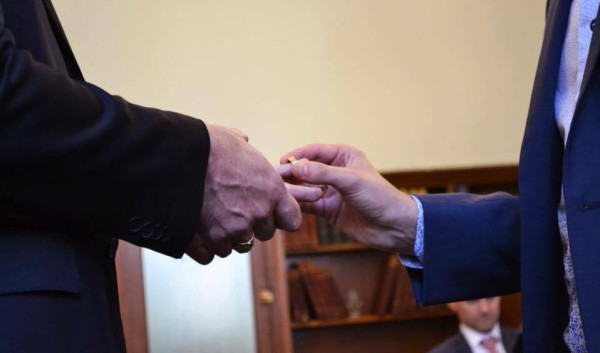

Much has been written about the burgeoning demand for investments that match up with investors’ ethical stance in the internet age – but there is another side to this.
Faith-based investments, a subset of ethical investing, do not generate the same level of attention but have come under the spotlight in recent times in the US. This follows the launch of two so-called biblically responsible exchange traded funds that notably exclude companies that participate in or support lesbian, gay, bisexual or transgender “lifestyles”.
Here, LGBT rights are lumped together with companies that have any degree of participation in abortion, gambling, alcohol, pornography, terrorism and oppressive regimes.
US asset manager Inspire Investing is the architect behind the ETFs. Its president and chief executive officer, Robert Netzly, said: “Our clients want to align their investments to support biblical values, which includes the traditional one man, one woman definition of marriage and invest in Inspire ETFs accordingly.”
The firm also adopts a positive screening, investing in a host of businesses including those that partake in philanthropic activities and notably those involved in protecting and preserving the environment.
Yet, interestingly and somewhat paradoxically, the strategy does not omit investment in some of the more contentious areas such as oil and armaments.
Mr Netzly said such investments are typically excluded from other socially responsible funds because they are managed to reflect the “progressive liberal agenda”.
He added: “Inspire ETFs are here to give investors with conservative, biblical values investment options that align with their values and beliefs. Oil and defence are not prohibited in the Bible, so we do not screen them out as we would an abortion drug manufacturer or pornography company.”
This is not to say that the investment strategy is skewed to those types of companies. Both funds follow indices created by the fund house Inspire. It adopts a scoring system which gauges companies based on their alignment with biblical values to determine the “most inspiring” companies, according to Mr Netzly.
Global hope?
Both investment products – called Inspire Global Hope Large Cap and Inspire Small/Mid Cap Impact – are not restricted to US investors as they are traded on the New York Stock Exchange, meaning UK investors could choose to invest if they so wished.
Despite the contentious nature of the ETFs, they have garnered public interest, attracting some £61m in assets in less than two months from launch, according to Mr Netzly.
A spokesman for the company cited Bloomberg data which showed that out of the 55 funds launched in the US to April this year, the Inspire Global Hope ETF is in the top 10 most successful, according to assets under management.
“The liberal media was surprised by how many people voted for Trump, and now they are being surprised at how many investors are buying Inspire ETFs,” Mr Netzly said. Back in Britain, such esoteric ‘anti-gay’ investments do not exist in the Investment Association universe, a spokesman for the trade body confirmed.
This is probably because there are few asset managers operating this type of mandate, and those who do may not want to be part of the IA sector, he said.
He added the IA does not exclude funds on the basis that they may be considered distasteful.
Funds that invest based on biblical values are nothing new. For example, LKCM Aquinas Catholic Equity Fund (formerly the LKCM Aquinas Value Fund) holds securities based on the guidelines set out by the United States Conference of Catholic Bishops. To this end, it avoids companies involved in abortion, contraceptives and embryonic stem cell research, among others.
Equally, Eden Tree Investment Management (formerly Ecclesiastical Investment Management) is owned by a charity with an inherent religious background.
The fund house’s parent group, Ecclesiastical Insurance Group, was set up to protect the Anglican Church. The group itself is owned by the charity Allchurches Trust which was established in 1972 “to promote the Christian faith and to contribute to the funds of other charities,” according to its website.
Shariah compliant
A spokesman for Hargreaves Lansdown said he was not aware of products similar to the biblical ETFs but said the firm does cater to the needs of Islamic investors by providing funds that comply with Shariah investment principles. This includes funds offered by Oasis Crescent as well as Aberdeen Global Services.
Sukuk bonds are among the more esoteric financial instrument to have been designed to circumvent the prohibition of owning investments that pay interest.
They replace distributions of interest with rent or profits which come from the assets underlying the sukuk. So a sukuk investor has shares in the ownership of the assets linked to the investment although this does not represent a debt owed to the issuer of the bond.
Esoteric they may be but this does not mean that there is little demand for the product. In fact, in summer 2014, the UK became the first western country to issue an Islamic bond, attracting orders totalling around £2.3bn.
Brian Adams, director and founder of Islamic Wealth Management, said: “The biggest problem is not many people are aware that there are products out there that align to their religious beliefs. In my experience, a lot of investments made by Muslims are restricted to buying a property and renting it out, but there are a lot of disadvantages when it comes to this type of investment – such as stamp duty.”
He added: “I would say categorically that the vast majority of advisers do not have a discussion with clients about investing based on their religious beliefs. Many do not consider this line of business because there is ample opportunity in the conventional adviser market.”
Myron Jobson is a former features writer of Financial Adviser
Key points
Faith-based investments have started to pick up in the US.
Anti-LGBT investments do not exist in the Investment Association universe.
Investments based on Shariah principles are already established in the UK, as are investment based on Anglican church beliefs.




